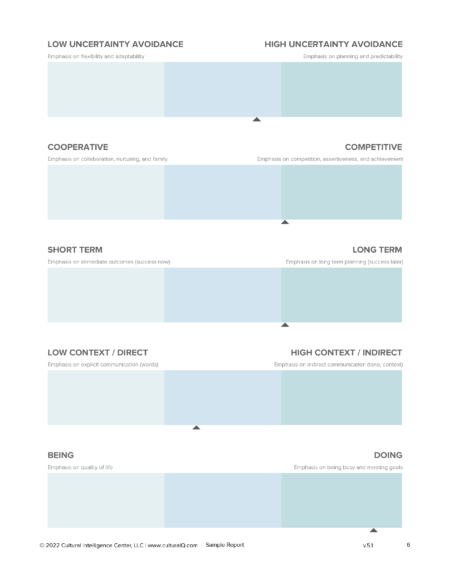Cultural Values Profile
Cultural Values are personal preferences that remain relatively stable over time. Our Cultural Values Profile measures personal preferences that influence your approach to life, school, and work. Scroll down to learn more.
What Are Cultural Values?
Cultural Intelligence (CQ®) is becoming a ‘must have’ for working and leading in the 21st century world. Understanding cultural value preferences makes the difference in whether you thrive or struggle in today’s multicultural contexts. The first step toward developing your CQ is to understand your cultural values, sometimes known as Behavioral Preferences.
Simply put, Cultural Values (CVs) are preferences people have for how they navigate life. These values indicate how people prefer to interact, communicate, plan, and complete tasks. By understanding and comparing your preferences with the preferences of others, you will develop insights that can help you improve your own interpersonal effectiveness. Cultural Values (CV) preferences are neither good nor bad, rather they describe how you prefer to do things.

The Cultural Values Dimensions
The cultural values feedback report provides you with feedback on your individual cultural value orientations. Cultural value dimensions include:
INDIVIDUALISM/
COLLECTIVISM
POWER DISTANCE
UNCERTAINTY AVOIDANCE
COOPERATIVE/
COMPETITIVE
TIME ORIENTATION
CONTEXT (DIRECT/INDIRECT)
BEING/DOING
UNIVERSALISM/
PARTICULARISM
EXPRESSIVENESS (NEUTRAL/AFFECTIVE)
FOCUS (MONOCHRONIC/
POLYCHRONIC)
Watch a short video on Cultural Values here
How to understand your cultural values feedback
Your cultural values feedback report (see sample report) shows your preference with a triangle along a continuum. The triangle indicates how you rated your preference for each cultural value. The triangle indicates which part of the continuum you prefer (toward the left/right, or in the middle). This is descriptive information. It is not better to be toward the left or the right of the continuum, or in the middle. If you scored toward one end of the continuum, that doesn’t mean you can’t work effectively with people from the other end of the continuum. But it does mean that both of you need to be flexible and understand the differences in your typical preferences.
Those in the middle of the continuum are not necessarily more adaptable than those on the extremes. Scoring in the middle shows that you prefer a more moderate approach—somewhere between the two poles.
Learn more about Behavioral Preferences for Teams

Why Are Cultural Values Important?
By understanding cultural value preferences and the importance of behavioral flexibility, you can improve your relationships and interactions with others.
Cultural values are also a useful way to talk about cultural differences using neutral terms, rather than polarizing or judgemental terms. For example, you can talk about a direct versus indirect approach to communication rather than a “rude” or “deceptive” approach.
Cultural values apply to both global and domestic contexts.
- Global applications include preparing people for overseas assignments and study abroad programs, helping them function effectively on global teams, devising strategies to enter a new international market, among others.
- Domestic applications include preparing people for unconscious bias training, helping them function effectively in multicultural teams, understanding a diverse market base, among others.
CQ White Paper
UNLOCK YOUR LEADERSHIP POTENTIAL – 10 KEY BEHAVIORAL PREFERENCES
SUMMARY:
The white paper explores 10 key behavior preferences for becoming a culturally intelligent speaker which includes:
- Individualism or Collectivism
- Cooperative or Competitive
- Being or Doing
In addition, you will learn about the difference between Behavioral Preferences and Personality Traits

Stay In Touch!
Ready to Get Started?
Have Questions?
We’d love to help! Fill out the form below and we’ll get back to you right away.
ABOUT THE CULTURAL INTELLIGENCE CENTER
The Cultural Intelligence Center is an innovative, research-based training and consulting firm that draws upon empirical findings to help organizations and individuals assess and improve cultural intelligence (CQ)-the ability to work effectively with people from different nationalities, ethnicities, age groups, and more. We create programs, workshops, certifications, and multiple-language assessments that are industry-specific and tailored to help people acquire CQ capabilities and harness their transformative powers in every aspect of their lives. Headquartered in the United States, our globally diverse team of experts and trainers serves clients all over the world to help everyone, everywhere unlock the power of CQ. More information about the Cultural Intelligence Center can be found on our website at www.CulturalQ.com.
STAY CONNECTED
Follow Us on LinkedIn | Subscribe to our Newsletter | Contact Us